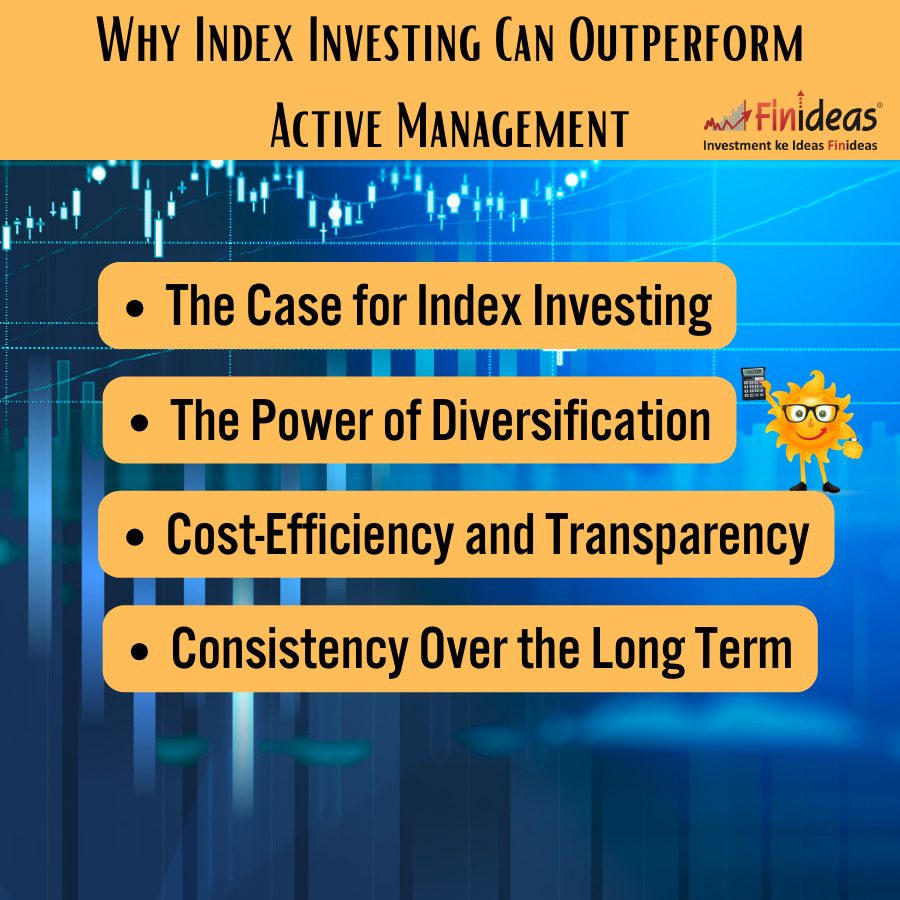Why Index Investing Can Outperform Active Management
Introduction
In the dynamic world of investing, the eternal pursuit of beating the market has led many investors down a complicated path filled with high fees, stress, and inconsistent returns. However, there’s a strategy that’s gaining immense popularity among Indian investors: index investing. In this blog, we’ll explore the concept of index investing and why it can outperform active management. As you read on, we’ll also connect the relevance of this approach to Finideas Index Long-Term Strategy, providing a solid foundation for your investment journey. Afterward, we’d love to hear your thoughts on whether you believe in the power of index investing. So, don’t forget to leave your comments below!
The Case for Index Investing
Active management involves choosing individual stocks and bonds in an attempt to outperform the market. The belief is that skilled fund managers can make strategic decisions to achieve higher returns. However, research has shown that beating the market consistently is a herculean task, even for seasoned professionals. This is where index investing comes in.
Index investing is all about passive investing, where you aim to replicate the performance of a market index like the Nifty 50 or the Sensex. This approach involves investing in all the assets within that index, allowing your portfolio to ride the overall market trend. By doing so, you eliminate the need for constant decision-making, reducing transaction costs and management fees.
The Power of Diversification
One of the key advantages of index investing is diversification. In India, we often hear the adage “Don’t put all your eggs in one basket.” This wisdom is the essence of index investing. When you invest in an index fund, your money is spread across a wide range of companies, sectors, and industries. Diversification helps mitigate risks. Even if one company or sector underperforms, the overall impact on your portfolio is minimal.
Furthermore, India’s stock market is influenced by a variety of factors, including economic conditions, political changes, and global events. Index investing shields you from the impact of these external factors, as your investments are distributed across a broad spectrum of assets.
Cost-Efficiency and Transparency
Active management often comes with a hefty price tag. Skilled fund managers, research teams, and trading costs all contribute to the expenses. These fees can significantly eat into your returns. In contrast, index funds are known for their cost-efficiency. They typically have lower expense ratios, as they require minimal active management.
Moreover, index investing is highly transparent. You can easily track the performance of the index your fund is mimicking. This transparency empowers you with a clear understanding of where your money is invested, making it easier to set realistic expectations and monitor your portfolio’s growth.
Consistency Over the Long Term
FinIdeas Index Long-Term Strategy is an example of how index investing can be leveraged for consistent returns. This strategy involves investing in a diversified portfolio of index funds with a long-term horizon in mind. The approach recognizes that the Indian market has historically shown strong growth over extended periods, making long-term investments particularly rewarding.
By maintaining a disciplined approach and staying invested through market ups and downs, this strategy aligns with the core principles of index investing. It aims to deliver steady returns while minimizing the stress and complexity associated with active management.
Conclusion
In the pursuit of beating the market, many investors often find themselves chasing elusive returns. However, index investing provides a compelling alternative by harnessing the power of diversification, cost-efficiency, and long-term consistency. The FinIdeas Index Long-Term Strategy exemplifies how these principles can work in practice.
Now, it’s your turn! Do you believe that index investing can outperform active management in the Indian context? Share your thoughts and experiences in the comments below. Your insights can help other investors on their journey to financial success.
Happy Investing!
This article is for education purpose only. Kindly consult with your financial advisor before doing any kind of investment.


